Jan 2009
Jan 2009 sadmin2009 CONFEDERATIONS TROPHY CONFEDERATION CUP: 2010 SCENE SETTER
2009 CONFEDERATIONS TROPHY CONFEDERATION CUP: 2010 SCENE SETTER sadmin South Africa will soon welcome the champions of champions to compete in the Confederations Cup tournament. Participating teams are the  winners of competitions in different continents including South America, North and Central America, the Caribbean, Africa, Europe and Asia.
winners of competitions in different continents including South America, North and Central America, the Caribbean, Africa, Europe and Asia.
Countries that will be represented are South Africa, Spain, Brazil, the USA, Egypt, New Zealand and Iraq. The current FIFA World Cup champions, Italy, will also compete.
Stadiums
The Confederations Cup is a scene setter for 2010. It will serve to test South Africa's state of readiness ahead of the FIFA World Cup.
A total of 16 matches will be played at four stadiums. They are Johannesburg's Ellis Park, Rustenburg's Royal Bafokeng, Pretoria's Loftus Versfeld, and Bloemfontein's Free State stadium.
How to get tickets
Tickets for the event opened for sale in November 2008 and can be obtained till the end of March this year. You can get your ticket in two ways: through the Internet at the tournament's official portal, FIFA.com, or at all First National Bank (FNB) branches. Ticket sales will be in two phases.
- First sales phase: 22 November 2008 to 31 March 2009. Ticket applications submitted during this stage will be processed, subject to availability, on a first-come-first-served basis.
- Last-minute sales phase: 1 April 2009 to 28 June 2009. In this phase, applications for tickets will also be processed on a first-come-first-served basis, but ticket transactions will take place directly at the point of sale.
Online sales
If you have access to the Internet, you can visit the FIFA Confederations Cup South Africa 2009 ticketing website, FIFA.com. Ticket prices will start from R70 upwards. All tickets available to residents of South Africa are payable in South African rands.
There are two types of ticket products available for the FIFA Confederations Cup South Africa 2009:
- tickets to individual matches
- venue Specific Tickets or VSTs: these are tickets based on matches to be played in a specific FIFA Confederations Cup stadiums.
If you don't have access to the Internet
- Ticket Application Forms
South African residents who do not have access to the Internet can apply for Confederations Cup tickets by using Ticket Application Forms. These are available from all First National Bank (FNB) branches.
Complete the Ticket Application Form and detach the Ticket Purchase Card. Once completed you can return your Ticket Application Form to a FNB branch, where all forms will be collected and checked by FNB for processing.
Alternatively, you can also post or fax the Ticket Application Form directly to the 2010 FIFA World Cup Ticketing Centre.
The address is: 2010 FIFA World Cup Ticketing Centre, PO Box 4928, Cresta, 2118. The fax number is: 011 567-2709.
Send only the ticket order form section of the Ticket Application Form.
2010 WORLD CUP IMPROVING TRANSPORT FOR 2010 AND THE FUTURE
2010 WORLD CUP IMPROVING TRANSPORT FOR 2010 AND THE FUTURE sadminSoon after South Africa was chosen to host the biggest sporting event in the world, government started preparing for the event. An amount of 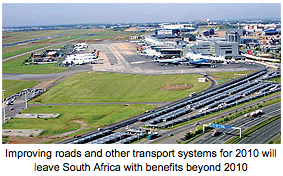 R11,7 billion was set aside to improve infrastructure like roads and public transport. This will give visitors to our country safe and accessible transport to travel to the different soccer events and to explore our country.
R11,7 billion was set aside to improve infrastructure like roads and public transport. This will give visitors to our country safe and accessible transport to travel to the different soccer events and to explore our country.
Disabled
Johannesburg residents recently had a chance to view a model of the city's Rea Vaya Bus Rapid Transit (BRT) station. The station is one of 150 that will be completed by May this year. This will be in time for the Confederations Cup in June, as well as the 2010 Soccer World Cup. The system is expected to transport about 430 000 passengers daily.
The system will reduce the number of cars used in the city, which means less traffic jams.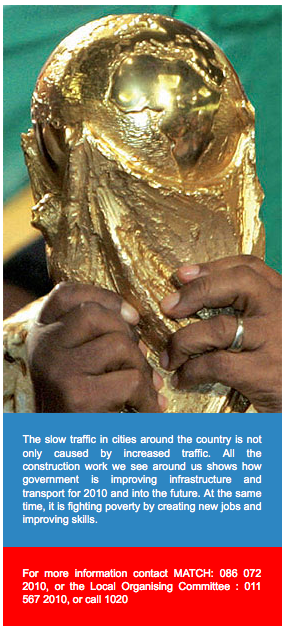
The BRT system was designed to be friendly to disabled people, including deaf and blind people. A special road will lead to the station so that public transport ser-vices will have easy access.
Gautrain
Work on the Gautrain rail link project is continuing. Two of the tunnels have already been connected- one from Mushroom Farm Park and one from the Marlboro Portal. The meeting of these two tunnels show that the project is on target to reach its goals. One of the goals is that the Gautrain route between Sandton and OR Tambo International Airport will be completed by May 2010. About 93 000 jobs relating to this project have been created.
Airport
Construction of the King Shaka International Airport in KwaZulu-Natal is also progressing well. It is scheduled to be completed by May 2010. This new international Airport at La Mercy north of Durban, will replace the existing Durban International Airport.
Studies have shown the Durban International Airport terminal is too small to handle the growing tourist and commercial trade through Durban, South Africa's busiest port. Passenger growth has doubled since 2005 from two million to four million passengers a year.
The new airport will be ready to handle passengers for the World Cup and thereafter. The runway is big enough to let new, large aeroplanes, called "new generation" aircraft, like the Airbus A380 super-Jumbo, land in the city. New access roads leading to the airport are also being built.
Jobs
So far, construction on the airport has created more than 3 000 jobs. It is expected that the number of jobs will increase to 6 000 once the airport starts working.
Apart from this airport, upgrades at the OR Tambo Airport in Johannesburg and at the Cape Town International Airport have also created thousands of jobs.
- Muzi Mkhwanazi
2010 WORLD CUP MAKING THE 2010 WORLD CUP SAFE
2010 WORLD CUP MAKING THE 2010 WORLD CUP SAFE sadminThe South African Police Service (SAPS) plans to put into practice its detailed security plan for the 2010 Soccer World Cup during the 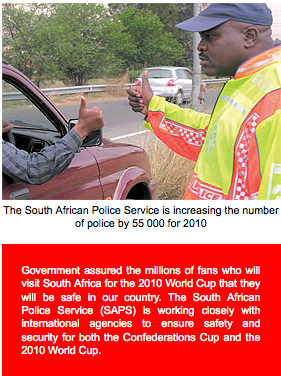 Confederations Cup in June.
Confederations Cup in June.
They are spending R640 million on putting into action thousands of officers to ensure a safe World Cup.
Through a major recruitment drive, the SAPS is employing many new members to increase general police numbers by 55 000 to more than 190 000 by 2009. The new recruits will be given special training to help them deal with large events like the World Cup.
In October last year, the SAPS and the French National Police Force held a joint 2010 crowd control exercise. This was done in preparation for dealing with visitors who will come to South Africa during the tournament. The crowd-control exercise was held at the Pretoria Police Academy.
Special training
The SAPS also held joint security exercises with the South African National Defence Force and other agencies, as well as government departments last year.
The security preparation exercises called "Operation Shield" were held in Port Elizabeth and Bloemfontein. The exercises were aimed at making sure that the South African security agencies had the necessary skills to deal with the major sporting events that are awaiting us.
Borders
Government's security plan focuses on border security at ports of entry. These include South Africa's land borders, harbours and airports. It also focuses on security along our roads, particularly roads from airports and other borders into the cities.
Host cities will be divided into different security sections. There will be teams of police officers patrolling each section. The patrols will focus on FIFA headquarters, hotels, and other places where people will stay.
Police will also patrol stadiums, fan parks, restaurants and tourist venues.
Special equipment
The security agencies will use modern communication equipment. This includes helicopters, crowd-control equipment, water canons and specially equipped cars to patrol highways.
Police will also use 300 mobile cameras. In addition, four mobile command centres will have the latest monitoring equipment. This equipment will be able to receive live images from the aeroplanes and security cameras.
After 2010
There will furthermore be special 2010 police stations close to every stadium.
The police will also have special crime-investigation teams and courts. They will look into and deal with all event-related crimes 24 hours a day. A 24-hour multilingual hotline will help visitors who need police assistance or medical services.
- Mbulelo Baloyi
2012 WORLD CUP BENEFITS BEYOND 2012
2012 WORLD CUP BENEFITS BEYOND 2012 sadmin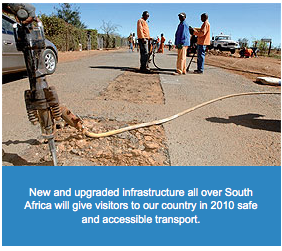 The 2010 World Cup will benefit South Africans greatly because it will leave us with an improved public transport system. We will use these facilities long after the 2010 Soccer World Cup is over.
The 2010 World Cup will benefit South Africans greatly because it will leave us with an improved public transport system. We will use these facilities long after the 2010 Soccer World Cup is over.
Ease traffic
Until now, South Africa's public transport system has been unable to handle the fast growing volumes of traffic, especially in big cities. This is causing problems like very heavy traffic and accidents during peak hours.
New transport services that will start operating before the 2010 World Cup, will help ease this problem greatly. For example, during peak traffic times there will be trains available every five minutes. Train services will run 16 hours a day and travellers will be able to hop from a train to a bus or taxi.
Skills
Apart from the transport benefits that South Africa will enjoy, many people are already benefiting from the 2010 project in terms of employment opportunities and skills development. Many construction workers, engineers, and business people got opportunities to improve their skills, grow their businesses or create jobs.
Some people will gain skills through working as volunteers for different projects during the World Cup. About 5 000 volunteers have already signed up to help during the Confederations Cup and 15 000 for the World Cup. But this will not only help to develop volunteer's skills, it will also give them an opportunity to be part of the greatest sporting event in the world.
APPLY FOR SOCIAL GRANTS THROUGH SASSA ONLY
APPLY FOR SOCIAL GRANTS THROUGH SASSA ONLY sadminGetting rid of poverty through social grants is one of government's main aims towards building a better life for all. People who want to apply for 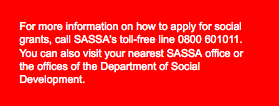 social grants are therefore urged to apply through the South African Social Security Agency (SASSA) only, and not through any unauthorised persons or organisations.
social grants are therefore urged to apply through the South African Social Security Agency (SASSA) only, and not through any unauthorised persons or organisations.
This message from government follows reports that unauthorised people have been handing out social grant application forms. Social grants are a government responsibility and action will be taken against people who are illegally involved in social grant matters.
Through social grants, the number of people struggling to earn a living in South Africa has dropped. This is because social grants have helped to raise the income of the poorest of the population. Since 1996, nine million people have been lifted out of poverty with more than 12 million now getting social grants. In the beginning of last year, government set aside R124 million to help poor households. Towards the end of the year, a further amount of R500 million was set aside.
- BuaNews
Advice: Prevent cancer - Live a healthy lifestyle
Advice: Prevent cancer - Live a healthy lifestyle sadminWorld Cancer Day, on 4 February, is aimed at making people aware of cancer and how to prevent it. The best way to prevent getting cancer, is to 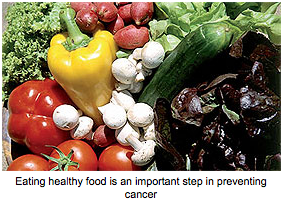 live a healthy lifestyle. This is also true for many other diseases.
live a healthy lifestyle. This is also true for many other diseases.
What causes cancer?
Like any other disease, cancer can be caused by a number of things. These include smoking, stress, unhealthy eating habits and drinking too much alcohol.
People who live healthy lifestyles will not drink more than two alcohol drinks a day; they will stop smoking and will eat healthy food. They will also try to balance work, family, rest and play and will talk about their problems with family or friends, or join support groups.
What can I do?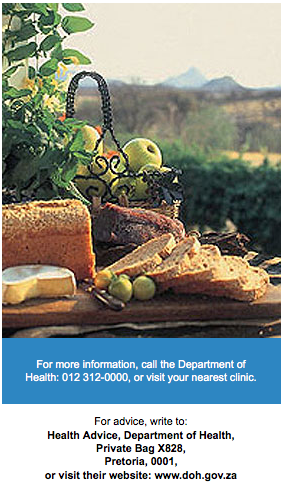
- Reduce stress by breathing properly. Take deep breaths through the nose and let it out through the mouth. Repeat for about ten minutes every day.
- Stop smoking; it is one of the leading causes of cancer.
- Follow a healthy eating plan. This includes drinking enough water, eating foods rich in fibre like bran, and eating about five fresh fruits and five portions of vegetables every day. Eat cooked tomatoes, tomato soup or sauce every day.
- Eat a handful of nuts and seeds, for example sunflower and pumpkin seeds every day. Eat less fat especially animal fat and hardened vegetable fats. Change your cooking methods. Do not use fat or oils, but rather boil food for a short period in a little bit of water.
- Stay away from direct sunlight, especially between 11 o'clock in the morning and three o'clock in the afternoon. During this time the heat from the sun is very strong and can damage the skin. Wear a hat and use a sunscreen lotion to protect the skin. Protect the eyes by wearing sunglasses.
What are the signs of cancer?
Look out for any changes in your body and go to hospital for a check-up. The following are some warning signs of cancer:
- change in normal bladder or bowel actions
- any sore that does not heal easily
- unusual bleeding or discharge from any body opening
- thickening or lump in the breast or elsewhere in the body
- indigestion, inability or difficulty in swallowing
- nagging, constant cough or hoarseness of voice.
- Muzi Mkhwanazi
EASIER TRANSPORT FOR DISABLED
EASIER TRANSPORT FOR DISABLED sadminMany disabled people dreaded travelling on public transport in the past because of the lack of facilities for wheelchairs. But things are now 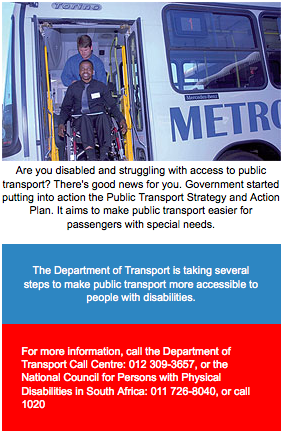 improving for them. Through the Public Transport Strategy and Action Plan of 2007, the Department of Transport is taking several steps to make public transport easier for people with disabilities. This is done in partnership with provinces and municipalities.
improving for them. Through the Public Transport Strategy and Action Plan of 2007, the Department of Transport is taking several steps to make public transport easier for people with disabilities. This is done in partnership with provinces and municipalities.
The Department has already started a number of trial projects. These include the Sukuma Project in eThekwini Municipality and the Dial-A-Ride in Cape Town.
Taxis
The South African National Taxi Council (SANTACO) and council members in the nine provinces are working with municipalities and transport authorities to make taxis accessible to disabled people.
Several taxi associations in different provinces have already introduced vehicles specially adapted for people with disabilities. New taxis will be built in such a way that people in wheelchairs can easily get in and out.
All new taxis that have been specially adapted to accommodate wheelchairs, must have clear signs that say they are certified to carry wheelchair users.
Routes
The City of Johannesburg already has a public transport plan in place that is user-friendly to people with disabilities.
For example, the city has several routes where buses stop at disabled people's organisations. These include the Soweto Workshop for the Blind, the National Council for Persons with Physical Disabilities, and special schools.
Buses
Public buses will be fitted with special ramps. The City of Johannesburg's Metrobus service already has in its fleet 15 low-floor, wheel-Easier TRANSPORT for DISABLEDchair-accessible buses. This means the floor at the entrance of the bus can be lowered to street level to allow wheelchairs easy access.
In the case of high-floor buses, the Action Plan proposes that the buses be fitted with mechanical hoists. Buses will also have things like hand rails and special areas inside for wheelchairs.
Learners
In KwaZulu-Natal, the provincial education department bought 58 new buses worth R55 million to transport deaf and mentally disabled children.
The department bought the buses because it was difficult for learners with special needs to take public transport to school. Seventeen of the 58 buses were handed to schools around Durban in November last year.
- Mbulelo Baloyi
FRESH PRODUCE MARKETS A HELPING HAND TO SMALL-SCALE FARMERS
FRESH PRODUCE MARKETS A HELPING HAND TO SMALL-SCALE FARMERS sadminIn a move to help small-scale farmers to get their products to big markets, government has put a plan into action to open up bigger markets to 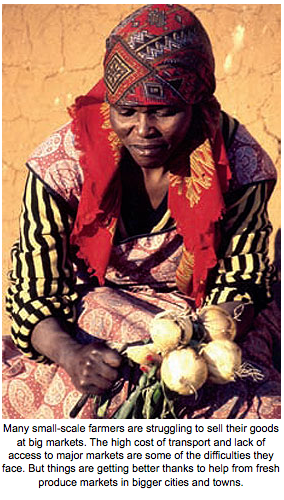 previously disadvantaged farmers. This is done through government's policy of changing the business processes of the past.
previously disadvantaged farmers. This is done through government's policy of changing the business processes of the past.
Programmes
In line with the plan, fresh produce markets in bigger cities are lending a helping hand to small farmers in rural areas.
There are about 19 major markets across the country and most of them have programmes in place to reach out to smaller farmers.
For example, the Johannesburg Fresh Produce Market is helping the Vhembe District Municipality in Limpopo to sell their goods at the Johannesburg Market.
Funding
Many big buyers, including major chain stores, exporters, whole-salers and informal traders buy from the Johannesburg Fresh Produce Market.
With funding from government, the Vhembe District Municipality is building a facility to package and grade products from small local farmers before sending it to Johannesburg. This is done to make sure the products meet the necessary quality standards.
Skills development
Once the new facility is complete, the Johannesburg Fresh Produce Market will give guidance on how to manage the facility. This will include meeting quality standards and applying quality control, marketing, development of packaging material, staff training, transport and hygiene standards.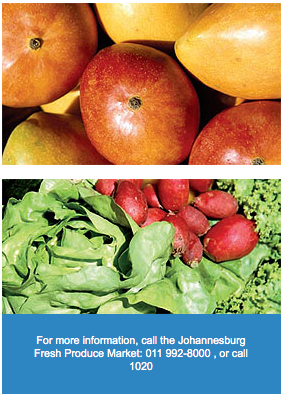
The guidance given to the officials who will run the facility, will help to develop their business skills. This is in line with government's policy of deve-loping skills to grow the economy.
Other cities
Other fresh produce markets in cities around the country are also reaching to out to small-scale farmers in their areas.
The Tshwane Market, for example, is teaching new farmers about packaging, as well as standardisation and grading of produce. They are also introducing new farmers to marketing agents who can sell the products on their behalf.
In the Northern Cape, the Kimberley Fresh Produce Market has undertaken road-shows to encourage smaller farmers to bring their products to the market. They will also teach local small farmers about quality and how to produce goods that meet the high standards required by the bigger markets.
The Mpumalanga Fresh Produce Market is helping new farmers with advice on how to produce products for which there is a high demand, like carrots and beetroot.
- Muzi Mkhwanazi
FUN PAGE SAY YES TO LEARNING NEW SKILLS...
FUN PAGE SAY YES TO LEARNING NEW SKILLS... sadminWhat are skills?
To have skills means you have the ability to do specific things well. Different people have different skills and talents.
How are skills developed?
Skills are developed through learning and training. At school we learn basic skills like reading, writing and maths. After school, we get more skills at institutions of higher learning like universities and colleges. If you are an apprentice, you learn from someone who is experienced.
What are scarce skills?
Scarce skills are skills that there is a shortage of. For example, we need more skilled teachers, doctors and nurses. So, let's all say YES to learning new skills.
Unscramble the letters
Print the image below to complete this game...
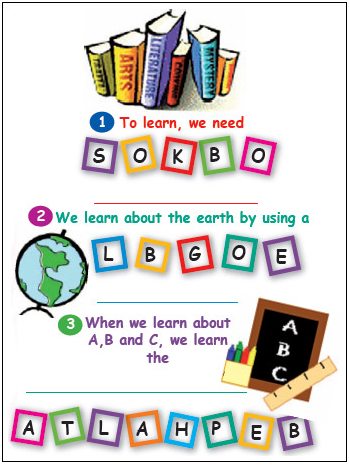
CLICK HERE FOR THE ANSWERS
Crossword Puzzle
Print the image below to complete this game...

CLICK HERE FOR THE ANSWERS
HELPING SMALL BUSINESSES TO HELP THEMSELVES
HELPING SMALL BUSINESSES TO HELP THEMSELVES sadminThe Department of Trade and Industry (dti), is helping thousands of small businesses in townships and rural areas. Their programme "Taking dti 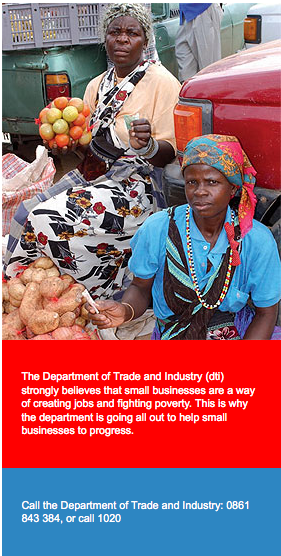 to the People", aims to inform people about products and support services for small businesses, offered by the department and its agencies. This is done through road-shows across all the provinces.
to the People", aims to inform people about products and support services for small businesses, offered by the department and its agencies. This is done through road-shows across all the provinces.
Information sessions
The Department started "Taking dti to the People" in July 2006. Its main purpose is to empower small, medium and micro enterprises in townships and rural areas.
This is done by giving people information that will help them to start new businesses or grow their existing businesses.
The road-shows take the form of information sessions, in which small business-people and those wanting to start small businesses, get advice. It includes how to start and register businesses and how to apply for funds to grow small businesses.
Agencies
The programme also tells people about the department's group products and services, as well as support services by the department's agencies.
These agencies include the Companies and Intellectual Property Registration Office (CIPRO), Khula, South African Micro-finance Apex Fund (SAMAF), the South African Women Entrepreneurs Network (SAWEN) and the Small Enterprise Development Agency (SEDA). SEDA has already established 40 branches around the country.
Women
Through SAWEN, the department started the Isivande Women's Fund (IWF) earlier this year. The fund started by setting aside R500 million to give business-women loans ranging from R30 000 to R5 million. The fund is divided into two focus areas, namely Isivande I and Isivande II.
Isivande I was started with R100 million. Old Mutual invested R50 million as a partner. This portion of the fund helps rural and semi-urban businesses. It targets companies that make a profit of not more than R100 000 per year.
Commitment
"Taking dti to the People" shows government's commitment to work together with communities across the country, as well as with provincial and local governments.
By doing so, the programme reaches remote and deep rural communities where people don't have ready access to information. Getting useful information empowers small-business owners to grow their businesses. It also gives hope to those who want to start their own businesses, but do not know how to start.
- Mbulelo Baloyi
KEEPING IT BRIEF
KEEPING IT BRIEF sadminGAUTENG
Unemployed youth living in three of Johannesburg's most disadvantaged townships will get help to improve their lives when the city opens three Youth Advisory Centres. Services provided by these centres will help youths in Ivory Park, Orange Farm and Diepsloot to develop their business skills and raise their chances of getting jobs or opening businesses. The centres are set up through an agreement between the city and the Umsobomvu Youth Fund.
- BuaNews
WESTERN CAPE
The first World Conference on Constitutional Justice, takes place in Cape Town from 23 January. Organised by the Constitutional Court of South Africa and the Venice Commission, the two-day conference, will bring together, for the first time, courts of constitutional justice from all over the world. The conference will look at the role of these courts within their societies and the development of human rights worldwide.
- BuaNews
MPUMALANGA
An agreement has been signed to build a R1,3 billion housing settlement in Emalahleni (formerly Witbank). A total of about 10 147 houses, 2 322 apartments, and community facilities will be built. Facilities will include schools, clinics, community centres and a cemetery. The settlement, which will be called Klarinet, will also have its own shopping mall. It is part of the national Department of Housing's Breaking New Ground programme.
- BuaNews
NORTH WEST
An amount of A R200 million housing development project in Mafikeng Extension 39 will help to boost the province's economy. It will create about 2 400 jobs and will use local contractors and material suppliers. The construction of the 811 houses was started at the end of last year and will be completed over a period of two years.
- BuaNews
KWAZULU-NATAL
The provincial Department of Transport has set aside R600 million to rebuild roads which were destroyed during the floods in June last year in the Ugu District Municipality. The Department of Local Government, Housing and Traditional Affairs also set aside R4 million to help the victims of floods whose houses were washed away.
- BuaNews
EASTERN CAPE
To address staff shortages and improve health-care services in the province, the provincial health department has called on retired nurses who are willing to help in community health-care facilities. The department is also looking at speeding up the training of nursing staff by starting bridging courses for nurses instead of letting them do a four-year training course.
- BuaNews
LETTERS TO THE EDITOR GIVE US A PIECE OF YOUR MIND
LETTERS TO THE EDITOR GIVE US A PIECE OF YOUR MIND sadmin
WINNING LETTER
Treat customers with dignity and respect
Some people who started their own businesses, lose their customers because they treat them in a disrespectful way. Don't forget that your 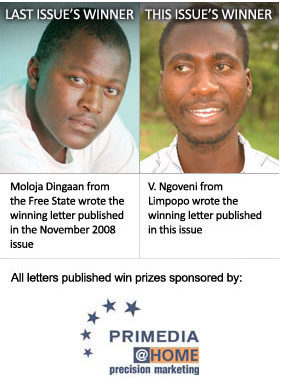 customers are your boss since you get money because of them. If a customer is cross with you, you must quickly find a way to make him or her smile again, even if he or she is wrong. Remember that in business the customer is always right. By treating customers with respect your business will grow strong so that you can face the many challenges that will come your way.
customers are your boss since you get money because of them. If a customer is cross with you, you must quickly find a way to make him or her smile again, even if he or she is wrong. Remember that in business the customer is always right. By treating customers with respect your business will grow strong so that you can face the many challenges that will come your way.
So, South Africa, please, let us learn to show respect and dignity to each other and to our customers so that our businesses could grow by increasing the number of customers.
- V. Ngoveni, Xihoko, Limpopo
Be open and honest about HIV and Aids
Aids is not an individual problem. It is so widespread that it affects all of us. Each of us has a duty to join the fight against this disease. While we are hiding it we will not be able to fight it.
We must break the silence and shame that surrounds Aids and deal with it openly and honestly. We must talk about it and bring it into the open so that we can deal with it. No one should be blamed for getting this disease; it can happen to any of us. But with knowledge and support we can make wise decisions and live HIV-free lives.
- Hajira Magwaza, Lamontville, KwaZulu-Natal
Live within your means
The price of goods and services are increasing every day and it's hitting us all hard. But we can pull through if we just consume what we need and use electricity economically. Many people buy simply to keep up with what their friends have. I wish people could learn to live according to what they can afford.
- Kenneth Mokone, Boleu, Mpumalanga
Let's start fighting poverty right now
I really love your magazine and I have learned many things from different stories.
I want to say to the readers that we must start helping each other. There are many poor people who don't have houses or food. They have to sleep outside and collect food in dustbins. Let's not blame government, we all have to work together with our government to fight poverty, crime and HIV and Aids. We can start by donating money and goods, or encouraging people to start their own businesses so that they can build houses for their families. Let's start doing something right now.
- Lwazi Mxolisi Mtsweni, Tweefontein, Mpumalanga
Let traffic officers do their jobs
When people don't do their jobs we complain, but when traffic officers do their jobs we also complain.
Especially in the morning, people get angry when there are traffic officers on the road, saying they'll be late for work. But there's a lot of traffic on our roads and lots of accidents happen. We can all help to avoid or eliminate them. Take responsibility, go to work earlier, don't drink and drive, and let traffic officers do their jobs in peace. They do an important job, so let's respect them.
- Monica Motshidisi Motaung, De Deur, Gauteng
Vote as a thinking nation
I am pleading with my fellow South Africans to go and register to vote, especially the youth. One philosopher said: "To reason critically is to think for yourself by challenging authority...".
To vote means we are going to question our government and to engage with possibilities and alternatives that our country offers. So let's go and vote as a nation that thinks and reasons critically.
- Fanyane Shabala, Steynsrus, Free State
Nobody likes a bully
Bullying is a big problem that affects a lot of children - it can make them feel scared, sad, worried, embarrassed or out of place. The stress of dealing with bullies makes it hard to concentrate on schoolwork when you're worried about how you are going to get around the bully. Having bullies around can take all the fun out of school. Some children are afraid to go to the library or the playground because of bullies.
Bullying affects everyone and not just the children who are getting picked on. Nobody likes a bully, so let's stand together against them.
- Miranda Dipheko, Ganyesa, North West
Stealing electricity makes others suffer
Our lives depend on electricity. Those of us who pay for electricity suffer because people connect it illegally. Because of this some of us end up not having electricity for days. I understand people are struggling and trying to make life cheaper, but please do it the right way. If you decide to open a business, find out how much connecting electricity would cost legally! Don't connect at someone else's place.
- Sello Thale, Tweefontein, Mpumalanga
Poverty is no excuse for crime
As a teenager I'm worried about crime among the youth. Many teenagers want to wear expensive clothes, but because they have no money, they do crime. They leave school because of the crime they do and then go and do more crime. A life of crime is not worthwhile. Poverty is no excuse for crime, because social development is there for you. Don't allow anyone to drive you to do crime, be the driver of your own life, don't be a passenger, because your life is precious.
- Thuso Khasibe, Maclear, Eastern Cape
Youth can create their own jobs
As youth, why do we waste our time and destroy our opportunities by committing crime, doing drugs and taking alcohol? We can create our own jobs, develop our country and reduce unemployment. There are so many opportunities if we look around. South African youth, let's stand up and show who we are. Older people are looking at us to be our best.
- Lerato Ramotsheki, Mokgwathi, Limpopo

MANAGING YOUR MONEY KEEPING YOUR CREDIT RECORD CLEAN
MANAGING YOUR MONEY KEEPING YOUR CREDIT RECORD CLEAN sadmin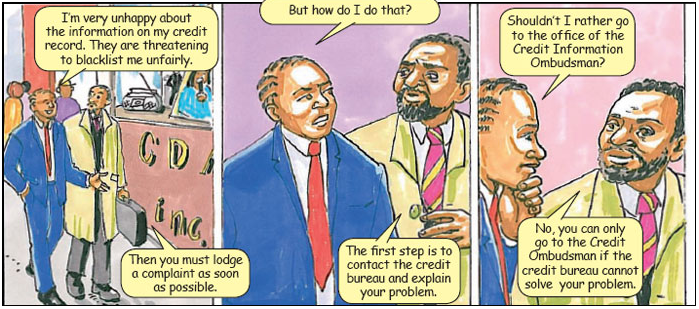
Following the right steps when you have a problem with your credit record will help to solve the problem quicker.
The first step to take when you do not agree with your credit information, is to contact the credit bureau. Tell them about your problem and ask them to correct the information. But remember to keep a record of all payments you have made.
them to correct the information. But remember to keep a record of all payments you have made.
In line with the National Credit Act, the credit bureau must solve your problem within a period of 20 working days.
Credit information
You can only go to the office of the Credit Information Ombud if you have tried to solve the problem with the credit bureau.
In line with the law, the office of the Credit Information Ombud can only handle complaints if it was reported to the credit bureau and they cannot solve the problem.
First point of call
It is important for people to remember that the credit bureau is the first point of call to complain about incorrect information on your credit record.
The credit bureau is forced by law to look into every complaint they get from people about credit information on records. If you don't agree with your credit information, you can take the following steps to lodge a complaint at the credit bureau:
- Make sure you have a record of all payments you have made on outstanding accounts
- Call the credit bureau and get a copy of your credit record - remember you are entitled to a free report per year.
- The credit bureau must give you a reference number when you lodge a complaint
- After you have lodged the complaint you must give the credit bureau a period of 20 working days to solve the problem.
If you're not happy
If, after the 20 working days period, you are not happy with the outcome of the investigation, you can take your complaint to the Credit Information Ombud. Remember to send them the complaint together with the reference number you got from the credit bureau. The services of the Credit Information Ombud are free.
- Muzi Mkhwanazi
PHOTOSTORY FINANCE FOR SMALL BUSINESSES
PHOTOSTORY FINANCE FOR SMALL BUSINESSES sadminKHULA ENTERPRISE FINANCE LTD
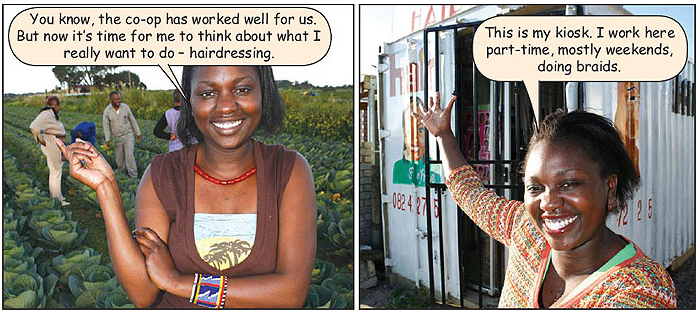
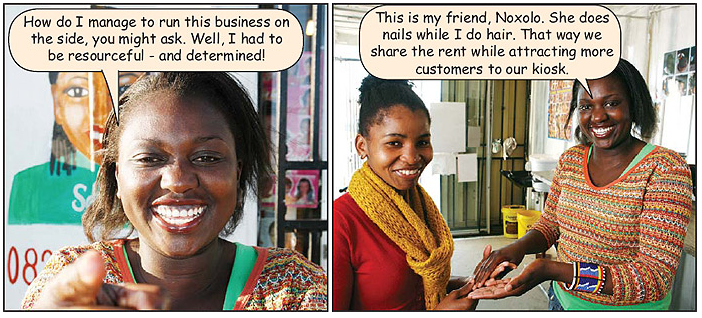
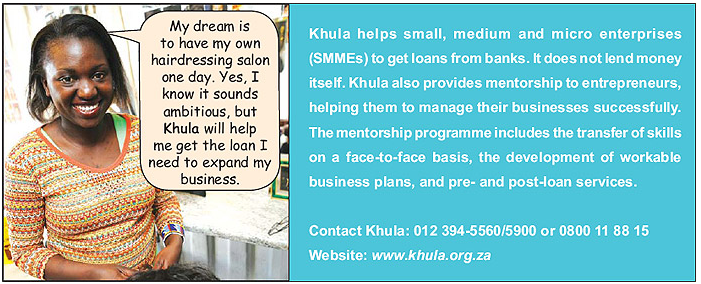
SOUTH AFRICAN MICRO-FINANCE APEX FUND (SAMAF)
The South African Micro-Finance Apex Fund (Samaf) gives financial services to small-scale entrepreneurs living in rural and outer urban areas. Samaf does not lend money directly to the public. It uses existing institutions within communities to handle the funds and lend to qualifying entrepreneurs. Samaf has three products: the Micro-Credit Fund (gives loans to entrepreneurs), the Capacity Building Fund (gives funds to be used for equipping the institutions with skills, systems and equipment) and the Savings Mobilisation Fund (encourages savings).
Contact Samaf: 012 394-1805
TECHNOLOGY FOR SUSTAINABLE LIVELIHOODS
Technology for Sustainable Livelihoods is a programme of the Department of Science and Technology (DST). It aims to create jobs for communities by helping to establish small, medium and micro enterprises (SMMEs). In particular, it makes use of technologies which can add value to SMMEs and make them accessible to communities. At the same time, the programme helps to make these SMMEs successful by offering skills development and training.
he DST offers technological assistance in the following areas: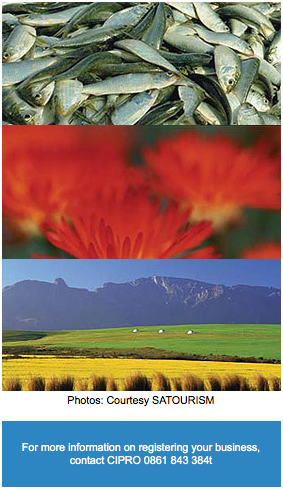
Aquaculture: Communities are trained to farm indigenous fish as a business. They get technology in terms of infrastructure (production cages) and training to manage a fish farm, including diseases and harvesting.
Essential oils: These are valuable oils that are extracted from the leaves and flowers of plants. Communities benefit from skills development and training, and their businesses are linked to the local essential oils market.
Indigenous medicinal plants: Communities are taught to grow indigenous herbs commercially. These plants have special medicinal properties which have been scientifically proven. Communities receive training in farming methods and in how to start a commercial enterprise. Their businesses are also linked to local markets.
The DST does not support individual people, only communities and community groups. These communities are then helped to form a viable community business in the form of a Section 21 Company or co-operative.
To use these technologies and produce valuable crops in essential oils and indigenous medicinal plants, communities need to have access to suitable agricultural land. Similarly, communities that want to benefit from fish farming must have access to irrigation dams.
Contact the DST Technology for Sustainable Livelihoods:
012 843-6421/18
REGISTERING YOUR BUSINESS
When you start a business, it needs to be registered. To do so, fill in the relevant forms and submit them to the Companies and Intellectual Property Registration Office (CIPRO).
ROLE MODEL SHE GOT UP AND DID IT FOR HERSELF
ROLE MODEL SHE GOT UP AND DID IT FOR HERSELF sadminLindani Dhlamini believes in getting up and doing things for herself. She owes much of her success as a business woman to this attitude and to 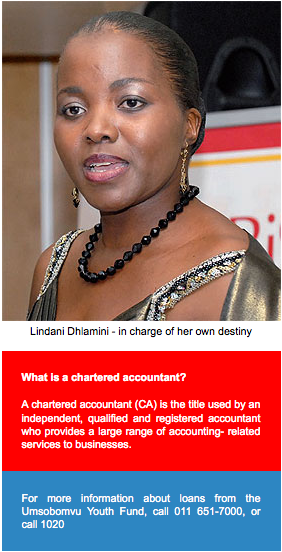 financial help from government's Umsobomvu Youth Fund. Her company, Xabiso Chartered Accountants, is one of a few black, female-owned companies in the accounting industry.
financial help from government's Umsobomvu Youth Fund. Her company, Xabiso Chartered Accountants, is one of a few black, female-owned companies in the accounting industry.
When Lindani Dhlamini started her company in 2004, it made a profit of R43 000. In November last year, its profit increased to R18 million.
Thanks to laws like the Preferential Procurement Act, Dhlamini's company has been able to tender and secure business from a wide range of companies including state departments. So far, she counts among her clients Anglo Platinum, Eskom, Public Investment Corporation and Transnet.
Umsobomvu
But empowering laws in themselves do not create successful business people. As the title of our magazine, Vuk'uzenzele, suggests, people must get up and do things for themselves. Dhlamini did just this. She talked to the Umsobomvu Youth Fund about her business plan and obtained a loan of R1,7 million to start her own business.
"I am very independent and wanted to be in charge of my own destiny. One way of doing so was to start my own business," she said.
Love for figures
Born 35 years ago in Umlazi, KwaZulu-Natal, Dhlamini completed her schooling in KwaZulu-Natal and furthered her studies at the University of Cape Town.
She said she had always been interested in figures, but did not register for an accounting degree. Instead, she completed a BSc degree in Computer Science. While working as a computer programmer, her divisional manager, who was a chartered accountant, encouraged her to follow her love for figures.
Chartered accountant
Dhlamini then registered for a BComm degree and later realised her dream of being a chartered accountant.
Chartered accounting is a much-needed profession in South Africa. The country is short of about 22 000 chartered accountants, according to the South African Institute of Chartered Accountants (Saica).
Dhlamini said people should make use of government's programmes and study loans to help them achieve their goals. She believes that through its policies, government makes it possible for people to be independent and start their own companies.
Helping others
Apart from her own success, Dhlamini encourages others to achieve success by helping them to develop skills. She mentors her employees in accounting skills and is sponsoring seven learners through high school and two students through university.
Dhlamini also offers financial support to employees who want to further their studies. In doing this, she is helping government's Joint Initiative on Priority Skills Acquisition (Jipsa).
- Muzi Mkhwanazi
SKILLS DEVELOPMENT ARTISANS CAN HELP THE ECONOMY GROW
SKILLS DEVELOPMENT ARTISANS CAN HELP THE ECONOMY GROW sadminOne of the main responsibilities of the Department of Labour is to promote skills development among South African workers and the unemployed.
Young people are encouraged to get training in scarce and critical skills as this can help our economy to grow. For example, there is a shortage of trained artisans. An artisan is a skilled worker who practices a specialised trade. Artisans include people like electricians, welders, mechanics, toolmakers, fitters and turners and millwrights. Their skills are mainly used in fields like manufacturing, construction and engineering production.
The Department of Labour has identified four paths to speed up the development of artisans. These are learnerships, apprenticeships, internships and Recognition of Prior Learning (RPL).
RPL is a way of recognising the experience and ability a person has in a specific skill as a result of having done work in that field over a period of time without having received formal training.
SKILLS DEVELOPMENT CHASING AWAY POVERTY THROUGH ARTS
SKILLS DEVELOPMENT CHASING AWAY POVERTY THROUGH ARTS sadminA group of people in a small village in Limpopo joined forces to chase poverty away. The Chivirikani Multi-Arts Project employs 17 women, 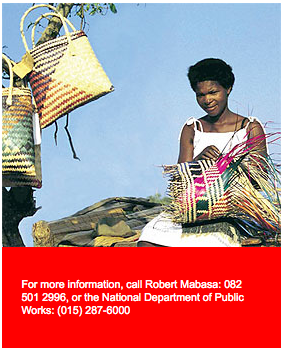 four men and two disabled people.
four men and two disabled people.
Based in the village of Lulekani, the Chivirikani Project was started under the leadership of Mr Robert Mabasa. He saw that some people had skills and others had none at all. So those with skills were asked to teach those with no skills.
In October 1998, they started making items like grass handbags, conference bags, lamps, beadwork, and traditional clothes to sell to tourists and shops. They worked under the trees that they used as their factory.
EPWP
In July 2007, government officials, including the Minister of Agriculture, visited the project. They saw the need for a proper place to work and contracted local builders to build them a small factory. This was done through government's Expanded Public Works Programme (EPWP).
The building is also used as a school for people who attend government's Adult Basic Education and Training (ABET) classes in the afternoons. The land surrounding the building is used to plant vegetables.
Culture
Since tourists visit them on their way to the Kruger National Park, the group started a cultural section where they entertain visitors. They plan to open a restaurant that will offer tourists European meals, as well as African meals, including dishes with mopani worms.
- Muzi Mkhwanazi
SKILLS DEVELOPMENT DEVELOPING ARTISTIC & CREATIVE SKILLS
SKILLS DEVELOPMENT DEVELOPING ARTISTIC & CREATIVE SKILLS sadminMany people have artistic or creative talents, but don't know how to develop their talents into skills, which can help them earn a living. The 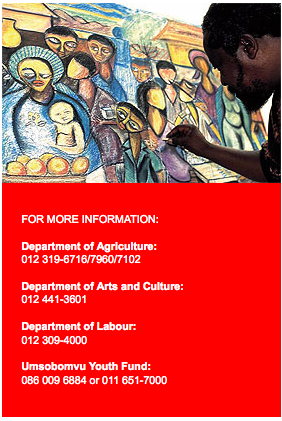 Department of Arts and Culture is reaching out to such people through different projects.
Department of Arts and Culture is reaching out to such people through different projects.
Rural Women
One such programme is the Mosadi wa Kono Kono campaign, which helps women with skills training in arts, crafts and cultural development in rural areas. It finds and helps women who show the ability to be leaders, especially in the poorest of communities. The programme has already been started in six provinces.
All Communities
Another programme is the Arts Access to All Communities project. This programme helps people to get training in the arts in all communities, especially children, women, people with disabilities, as well people in correctional centres. So far, the programme has funded the training of 20 community arts counsellors.
A further 12 community arts counsellors will have their training upgraded. When they complete their training, the graduates do their internships in community facilities. They are then placed with Community Art Centres.
Community Art Centres
Community Art Centres directly bene-fit members of the targeted communities. They offer skills development programmes in things like music, craft, heritage and sewing.
The Community Art Centres also run Women Entrepreneurial Skills Training Centres. These centres focus on training women in things like computer literacy, entrepreneurship, business and financial management.
The Department of Arts and Culture has other ongoing skills development programmes like the National Youth Expressions Campaign. It targets young people and provides skills training and employment opportunities.
SKILLS DEVELOPMENT EARNING THEIR DAILY BREAD
SKILLS DEVELOPMENT EARNING THEIR DAILY BREAD sadminA grant from the National Development Agency (NDA) is taking a group of 10 young men and 30 women from poverty and dependency to 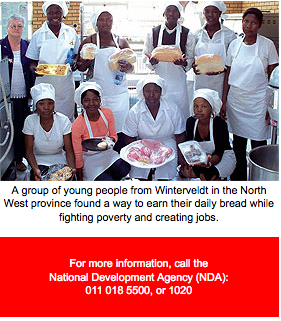 independence and entrepreneurship.
independence and entrepreneurship.
The NDA grant of R790 000 is helping this group of young entrepreneurs to create jobs through supplying bread from their bakery to the local community.
The grant is also helping them to improve their business skills through specialised training.
Skills training
Some of the money from the grant was used for skills training at the local DWT Nthathe Mercy Skills Training Centre. The rest was used to buy a delivery van and some much-needed equipment for the bakery.
Regular income
The bakery was started to fight poverty in the area by creating jobs and supplying affordable bread to the community of Winterveldt.
It also supplies spaza shops and women selling at schools with fresh and affordable bread.
The 15 women selling at schools are making a living and are able to feed their families as there is a regular income.
Share experience
The NDA said they were proud to see their efforts and resources being put towards a successful project like the Manna Bakery. They hoped that the young people who received training would share their knowledge and experience with other people who are in need of skills in order to survive.
- Mbulelo Baloyi
SKILLS DEVELOPMENT LET US LEARN TO READ AND WRITE
SKILLS DEVELOPMENT LET US LEARN TO READ AND WRITE sadminKha ri Gude means "let us learn" in TshiVenda. This mass literacy campaign reaches out to adults who didn't go to school. It teaches them to read 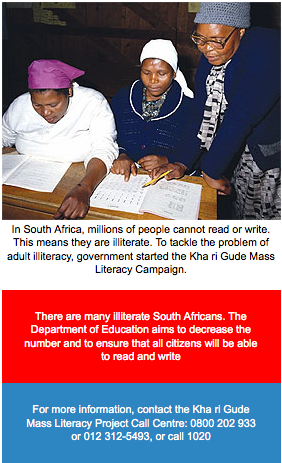 and write in their first languages. They also learn to do Mathematics and to speak English.
and write in their first languages. They also learn to do Mathematics and to speak English.
Government will be spending R6,1 billion on this campaign over five years. It enable 4,7 million South Africans to achieve literacy by 2012.
ABET
The campaign forms part of government's Adult Basic Education and Training (ABET) programme. To date, world-class learning materials have been developed with the support of the United Nations Educational, Scientific and Cultural Organisation (UNESCO).
The campaign will ensure that there are not more than 15 learners to one teacher in the adult schools. This will help teachers to give individual attention to each learner. Studies have shown that it takes about six months for a person to be trained in literacy and numeracy.
Volunteers
Classes started in April 2008. So far, 360 000 learners have enrolled of which 24 per cent are 60 years or older. About 20 per cent of the learners are young people below the age of 20.
About 24 000 volunteer teachers, 2 800 supervisors and 150 co-ordinators have been recruited and trained. Volunteer teachers receive a monthly stipend of R1 200 a month. As some of them are unemployed teachers this fights poverty as it helps them to support their families.
A co-ordinator helps 20 supervisors. A supervisor trains 10 volunteers and a volunteer is expected to recruit 15 learners.
Religious organisations and other community structures are mainly used to select the educators.
Official languages
The learning materials have been developed in all 11 official languages as well as in Braille. Workshops have also been held to train 100 blind teachers and 50 deaf co-ordinators.
In addition, the programme teaches foreign nationals to speak South Africa's local languages.
- Mbulelo Baloyi
SKILLS DEVELOPMENT NEW SKILLS, MORE PROFIT, LESS POVERTY
SKILLS DEVELOPMENT NEW SKILLS, MORE PROFIT, LESS POVERTY sadminThe Rivoningo Community Project, which was started in 2005, is a pig farming business. Based in the village of Sasekani near Tzaneen in 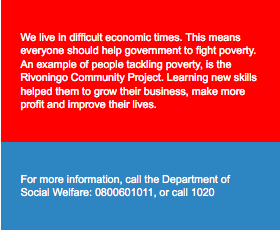 Limpopo, they are now selling more than 50 pigs a month to different abattoirs in the province.
Limpopo, they are now selling more than 50 pigs a month to different abattoirs in the province.
Jipsa
Project members were able to start the business after officials from the Department of Social Development visited the project. They realised that there was a need for training because pig farming is a specialised field, which requires specific skills and knowledge. So they offered them community courses in pig farming.
The courses offered to the community are in line with government's Joint Initiative for Priority Skills Acquisition (Jipsa). Through Jipsa, government identifies scarce skills and puts plans into action to develop such skills.
New skills
The courses offered to the community included topics like pig welfare, diseases and vaccinations, piglet rearing, nutrition, reproduction and accommodation. They were given practical information about the importance of good hygiene, how to reduce stress in pigs, how often they should be fed, keeping healthy pigs away from sick ones, and keeping piglets warm.
Learning new skills has enabled them to raise healthier pigs and prevent pigs dying from diseases. It also helps them to increase the number of pigs they sell, which means they are making a bigger profit. This, in turn, benefits the whole community as they are fighting poverty in these difficult economic times.
- Muzi Mkhwanazi
SKILLS DEVELOPMENT PREPARING TO FACE A BETTER FUTURE
SKILLS DEVELOPMENT PREPARING TO FACE A BETTER FUTURE sadminGovernment, through different national departments, is identifying those scarce skills that the economy cannot do without.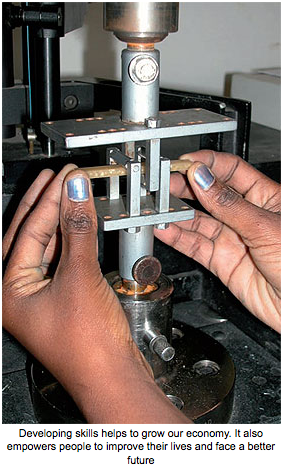
Sector Education and Training Authorities, called SETAs for short, form part of government's plan to develop such skills. The Department of Labour, in turn, has plans in place to help SETAs get information on scarce and critical skills.
Scarce skills are those that we have a shortage of and critical skills are those that the economy cannot do without.
Programmes
If we do not speed up skills training and development, South Africa could have a shortage of skills in the infrastructure sector for the next ten years. This could result in some big projects being delayed.
To speed up skills training, the Department of Labour with the help of the Umsobomvu Youth Fund and other government departments, have started skills development programmes that are available to unemployed youth and graduates.
The Youth Fund helps skills development and job creation through special youth development and entrepreneurship programmes. In addition, the Youth Fund also helps to reduce the high rate of unemployment among the youth by helping them to find jobs.
FET colleges
The labour and education departments are also speeding up skills development through Further Education and Training (FET) colleges, formerly known as technical colleges. This forms part of their contribution to the Umsobomvu Youth Fund's skills development projects for the youth.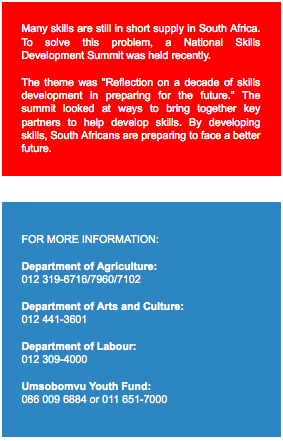
The Umsobomvu Youth Fund is presently working with 19 FET colleges to create skills programmes and learnerships.
The partnership between the Youth Fund and the FET colleges is aimed at reaching out to the youth, especially in poor communities in rural areas.
So far, learners in these communities have had limited access to training programmes.
Employees
The co-operation between the SETAs and the FET colleges is meant to link education with skills training. This gives young people the specific skills needed by employers in the workplace.
To help young people to access learnerships, the Department of Labour has put in place the Employment Skills Development Agencies (ESDA).
These agencies form a link between the learners and SETAs. They help those who seek learnerships through a training service company that offers training in particular fields as needed. There are ESDA offices in all the provinces.
Agriculture
The National Department of Agriculture has different skills deve-lopment programmes.
The Young Agricultural Entrepreneurs Development Programme specifically targets the youth. Its aim is to help young people who want to start businesses in the farming sector.
- Mbulelo Baloyi
YOUTH CELLPHONES AGAINST HIV & AIDS
YOUTH CELLPHONES AGAINST HIV & AIDS sadminloveLife, South Africa's National HIV Prevention Programme for Young People, is using cell phones to fight HIV and Aids among the youth. 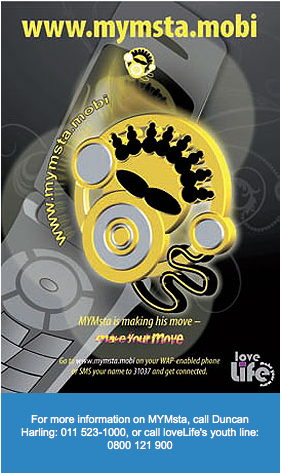 MYMsta is the world's first cell-based social network for youth empowerment and HIV prevention.
MYMsta is the world's first cell-based social network for youth empowerment and HIV prevention.
In a move to prevent HIV infections among youth, loveLife started MYMsta in June 2008. Those with WAP-enabled cell phones can join MYMsta on www.mymsta.mobi and access a range of information.
loveLife set up the MYMsta mobile social network because almost 75 per cent of South African youth have access to cell phones, while only 6 per cent have access to the Internet. MYMsta is a call to young people to "Make Your Move".
The Make Your Move campaign comes from studies which show that young people do get the message about HIV prevention. But what continues to drive HIV is not their response to the message, but their response to their circumstances. The belief that they have limited opportunities is the main driver of the HIV and Aids epidemic in South Africa. One of MYMsta's main goals is to link youth to volunteer programmes, bursaries, learnerships, internships and job opportunities.
Young people who feel they have opportunities are more likely to protect themselves from HIV because they feel they have something to live for. MYMsta also offers sexual health, motivational and life skills information, world news, movies and music reviews along with other interesting features. loveLife works in partnership with the Natio-nal Youth Com-mission (NYC).
YOUTH MAKE SURE YOU STUDY AT A REGISTERED INSTITUTION
YOUTH MAKE SURE YOU STUDY AT A REGISTERED INSTITUTION sadminBefore you jump for joy that you have been accepted at a private institution of higher learning, make sure it is registered. Some institutions are 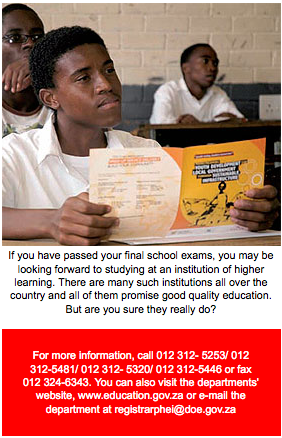 not trustworthy and it is your responsibility to find out whether the one you have chosen is registered. This is a simple process that can save you a lot of money.
not trustworthy and it is your responsibility to find out whether the one you have chosen is registered. This is a simple process that can save you a lot of money.
The Registrar of Private Higher Education Institutions is a body set up by government. It is responsible for protecting the public against illegal private institutions of higher learning.
Within the law
Registered institutions work within the law and the programmes they offer are also registered. This means they have everything that is necessary to provide good quality education. The qualifications that students get from them are recognised by the National Qualification Framework.
The Registrar of Private Higher Education Institutions can tell you which institutions are registered, which have temporary registration and which registrations have been cancelled.
Next to the name of the each registered or temporary registered institution is a list of programmes for which the institution is registered and the addresses where programmes will be offered.
Information booklet
A booklet containing information on what parents or students need to know about registering in private higher institutions of learning is available at the Department of Education.
Students and their parents can also call or e-mail the Department of Education to find out whether a specific institution is registered or not.
- Muzi Mkhwanazi